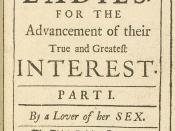The Educational Advances of Women in the 17th and 18th Centuries
Conventional wisdom has presented the Enlightenment Period as a watershed in artistic and intellectual development, marking the beginnings of the 'modern,' in terms of cultural views and practices. For women, particularly, this period was even more liberating than to men. Great advances were made in art and literature for women, and finally after years of oppression, the female voice was to be heard. Did women have a Renaissance?
Literature reflects not only the author's thoughts, but also the society in which the author lived. A close study of the lives of women in literature of the pre-modern world shows they suffered from increasingly repressive social constraints. In early societies, women bore children, cared for the home and helped maintain the family's economic production. Men hunted, made war, assumed primary responsibility for the family's economic welfare. The patriarch figure Orgon in Tartuffe is a good example of how the Father of the house has absolute power and is a basic belief of the Enlightenment Era.
Male dominance was important from the time of the earliest written historical records, probably as a result of men's discovery of their role in hunting and warfare as activities necessary for existence. The belief that women were naturally weaker and inferior to men was also certified by god-centered religions. In the Bible, God placed Eve under Adam's authority, and Paul urged women to be submissive to their husbands. In Hinduism, the reward of a proper woman is rebirth as a man, ancient Chinese women were considered to be the property of their fathers or husbands and in Japan, women were dressing in men's clothing in order to obtain the same benefits as men (Reece). In most traditional societies, women generally were at a disadvantage. Their...



Nicely written paper
Nicely written paper with useful information on the subject and perfectly cited sources.
0 out of 0 people found this comment useful.